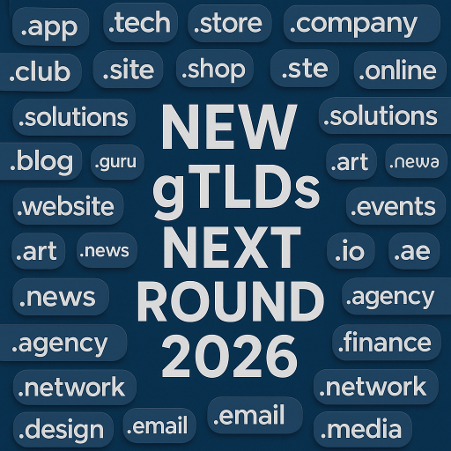Building the Next Internet Identity: Why New gTLDs Matter in 2026
The domain name system is evolving in ways that are quietly redefining online identity. While the majority of the web still operates on legacy extensions like .com or .net, a parallel ecosystem has emerged through New generic Top-Level Domains (New gTLDs) — offering brands, communities, and entrepreneurs more control, creativity, and security than ever before.
And with ICANN's next application round expected in 2026, the timing to explore this opportunity couldn't be better.

What are new gTLDs?
New gTLDs refer to top-level domains introduced via ICANN's expansion program, beginning with its first application round in 2012. Unlike registering a domain name, applying for a gTLD means applying to operate a registry — you own and control the entire namespace.
There are two major paths in this space:
1. DotBrand TLDs
These are brand-specific domains like .audi, .microsoft, or .sbi. They offer secure, branded digital real estate that can't be misused by third parties. They also improve user trust, simplify navigation, and eliminate the risks of phishing or impersonation.
Some examples:
- Microsoft uses support.microsoft and surface.microsoft for official platforms.
- Audi runs product, country, and dealership domains like
a4.audi,in.audi, and hannover.audi. - SBI, India's largest bank, uses
.sbifor all services, resulting in over 16 million visits per month and a significant drop in phishing losses.
If your company is considering this route, it's worth speaking with New gTLD consultants to map out the strategic and operational steps.
2. Generic gTLDs (Registry Businesses)
Beyond DotBrands, entrepreneurs and companies can apply for generic extensions like .web, .green, .store, or even new ideas like .crypto, .healthcare, or .designagency.
This is a business opportunity: the operator of a generic gTLD becomes a registry — selling and managing domains under that extension. Think of it as owning a piece of internet infrastructure. If successful, it can become a recurring-revenue business powered by registrar partnerships and premium name monetization.
The 2012 round created multiple registry success stories—some were acquired for millions of dollars. For those with a go-to-market plan and operational support, launching a new gTLD registry in 2026 could be a bold and profitable move.
Want to know what it takes to get started? A seasoned New gTLD consultancy can help build that blueprint.
What to expect in the ICANN 2026 round
ICANN has confirmed it will open the next application window for new gTLDs in 2026. Much like the previous round, the window will likely remain open for a short period — around 90 days.
Applying for a gTLD involves technical, financial, and policy requirements that need months of preparation. It's not a domain purchase — it's a governance role. Successful applicants operate a top-level registry, interface with ICANN, and are responsible for compliance, abuse mitigation, and DNS stability.
Early preparation with a New gTLD application expert is essential if you're serious about applying.
Why now is the right time to prepare
If your organization sees value in brand security, namespace innovation, or vertical-specific TLDs, now is the time to explore the roadmap to 2026. A reliable New gTLD consultancy can help you:
- Evaluate eligibility and feasibility
- Create the necessary financial and technical documentation
- Choose between DotBrand or generic registry models
- Define long-term registry operations and business plans
- Ensure ICANN compliance at every stage
Whether you're a registrar considering vertical expansion or a brand evaluating identity security, understanding your path to apply for a new gTLD is step one.
Final thoughts
Realtime Register's role in helping brands manage domains globally puts it in a unique position to shape the next phase of DNS innovation. As the internet fragments across channels, markets, and platforms, New gTLDs offer clarity, ownership, and resilience.
Some will use them to secure their brand. Others will use them to build a registry business. The smartest will prepare now — before the next round begins.
About the author:
Venkatesh Venkatasubramanian
New gTLD Registry Consultant (New gTLD Program)
Specializing in domain strategy and new gTLD applications